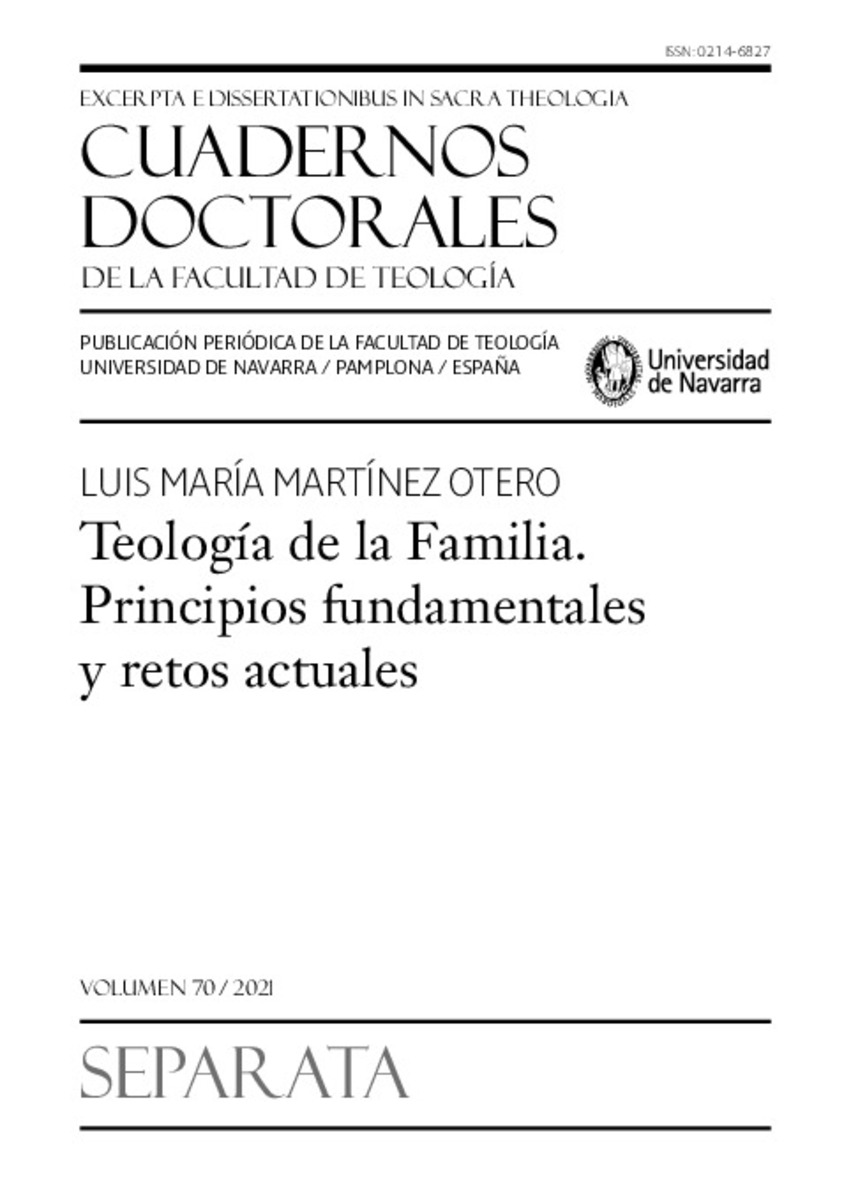Full metadata record
| DC Field | Value | Language |
|---|---|---|
| dc.creator | Martínez-Otero, L.M. (Luis María) | - |
| dc.date.accessioned | 2021-06-21T10:58:29Z | - |
| dc.date.available | 2021-06-21T10:58:29Z | - |
| dc.date.issued | 2021 | - |
| dc.identifier.citation | Martínez-Otero, L.M. (Luis María) | es |
| dc.identifier.issn | 0214-6827 | - |
| dc.identifier.uri | https://hdl.handle.net/10171/60726 | - |
| dc.description.abstract | En este trabajo se presenta una sintesis de lo que la Teologia ha dicho sobre la familia. Para ello se aborda el tema desde las tres vertientes que constituyen las fuentes de la Teologia: Sagrada Escritura, Tradicion y Magisterio. Se explica como a lo largo de la historia la Teologia ha estudiado la familia casi exclusivamente en su ambito matrimonial. La institucion matrimonial y la familiar estan intrinsecamente relacionadas, pero –dado que la familia es algo mas que el matrimonio– cabe un estudio mas profundo y con enfoques mas amplios. Se muestra como a partir del Concilio Vaticano II se dio un auge de los estudios sobre la familia: la familia como Iglesia domestica, el papel de la familia en la sociedad, las relaciones intrafamiliares (paterno-filiales y fraternales, ademas de la conyugal), estudios biblicos sobre la familia, etc. Se destaca la aportacion a este campo del magisterio de san Juan Pablo II y la reciente Exhortacion Apostolica Amoris Laetitia del papa Francisco. Deteniendose en las fuentes de la Teologia y de modo especial en el Magisterio de los ultimos Romanos Pontifices, se elabora un marco que sirve de base para una profundizacion en los distintos temas que la teologia debe afrontar para dar respuesta a las necesidades de las familias del siglo XXI. | es_ES |
| dc.description.abstract | In this thesis we present a synthesis of what Theology –rooted in Sacred Scripture, Tradition and Magisterium– has said about the family. We explain how, throughout history, theology has studied the family almost exclusively in its matrimonial aspect. The matrimonial institution and the family institution are intrinsically related, but –given that the family is something more than just marriage– there is a need for a deeper study and a broader approach. Our research shows that after the Second Vatican Council there was a flourishing of studies on the family: the family as a domestic Church, the role of the family in society, intrafamily relations (paternal-filial and fraternal, in addition to conjugal), biblical studies on the family, etc. The thesis highlights the particular contribution of St. John Paul II’s teaching as well as Pope Francis’ recent Apostolic Exhortation Amoris Laetitia. Based on the sources of theology and the Magisterium of the latest Roman Pontiffs, we propose a framework that may serve as a basis for delving more deeply into specific issues that theology must study in order to respond to the needs of the families of the 21st century. | es_ES |
| dc.format.extent | 540 | es_ES |
| dc.language.iso | spa | es_ES |
| dc.publisher | Servicio de Publicaciones de la Universidad de Navarra | es_ES |
| dc.rights | info:eu-repo/semantics/openAccess | es_ES |
| dc.subject | Familia | es_ES |
| dc.subject | Faimiliaris Consortio | es_ES |
| dc.subject | Amoris Laetitia | es_ES |
| dc.subject | Family | es_ES |
| dc.title | Teología de la Familia. Principios fundamentales y retos actuales | es_ES |
| dc.type | info:eu-repo/semantics/article | es_ES |
| dc.publisher.place | Pamplona | es_ES |
| dadun.citation.endingPage | 383 | es_ES |
| dadun.citation.publicationName | Cuadernos Doctorales de la Facultad de Teología. Excerpta e Dissertiationibus in Sacra Theologia | es_ES |
| dadun.citation.startingPage | 303 | es_ES |
| dadun.citation.volume | 70 | es_ES |
Files in This Item:
Statistics and impact
Items in Dadun are protected by copyright, with all rights reserved, unless otherwise indicated.






